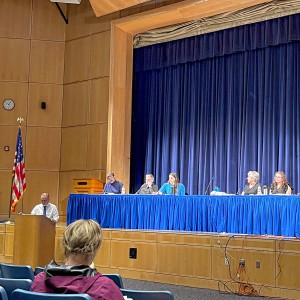Beacon Hill Roll Call: July 31 to Aug. 4, 2023
| Published: 08-11-2023 6:39 PM |
Beacon Hill Roll Call records local representatives’ and senators’ votes on roll calls from the week of July 31 to Aug. 4.
The House, 156-2, and the Senate, 39-0, approved and sent to Gov. Maura Healey a conference committee version of a $56.2 billion fiscal year 2024 state budget. The price tag represents a $3.8 billion increase over last fiscal year’s budget. The House and Senate had approved different versions of the budget and a conference committee hammered out a compromise version agreeable to both branches.
Provisions include $171.5 million to require public schools to provide universal free school meals to all students; $50 million to support free community colleges; $50 million to create Green School Works, a program to fund projects to install and maintain clean energy infrastructure at public schools; $6.59 billion in Chapter 70 education funding, an increase of $604 million over last year; $504.5 million for the special education circuit breaker; $181 million for MBTA capital projects; $19.81 billion for MassHealth, the state’s Medicaid program that provides health care for low-income and disabled persons; and a new law that prisons must provide free unlimited incoming and outgoing phone calls for prisoners.
Another provision would allow undocumented/illegal immigrants to qualify for the lower in-state college tuition rate if they attended high school here for at least three years and graduated or took their high-school equivalency test (HiSET).
“This budget represents a major step forward for our commonwealth, particularly in making higher education more affordable and more accessible to everyone,” said Senate President Karen Spilka, D-Ashland. “Tuition equity, free community college for nursing students and students 25 and older, and laying the groundwork for free universal community college starting next fall — all part of the Senate’s Student Opportunity Plan — are crucial to securing our long-term competitiveness, providing residents with concrete ways to create the futures they dream of, and continuing our state’s commitment to education at every level.”
“From critical investments in health care and workforce development, to funding for new initiatives that are designed to increase educational opportunities, better support working families, and provide for a safer and more reliable public transportation system, this fiscal year 2024 budget will help to make Massachusetts more affordable, while ensuring that the commonwealth’s most consequential institutions work better for Massachusetts residents,” said House Speaker Ron Mariano, D-Quincy.
“Massachusetts continues to move in a positive direction by making significant investments in this budget,” said Rep. Todd Smola, R-Warren, the ranking House member of the Committee on Ways and Means. “We prioritize local funding by increasing general government aid to municipalities and double the minimum aid contribution per pupil for education.”
“While there were many good provisions in the budget, the final version contained policies, unrelated to the budget itself, that we could not support,” said Reps. Nick Boldyga, R-Southwick, and Marc Lombardo, R-Billerica, in a joint statement.
Article continues after...
Yesterday's Most Read Articles
 Bridge of Flowers in Shelburne Falls to open on plant sale day, May 11
Bridge of Flowers in Shelburne Falls to open on plant sale day, May 11
 As I See It: Between Israel and Palestine: Which side should we be on, and why?
As I See It: Between Israel and Palestine: Which side should we be on, and why?
 $12.14M school budget draws discussion at Montague Town Meeting
$12.14M school budget draws discussion at Montague Town Meeting
 Greenfield homicide victim to be memorialized in Pittsfield
Greenfield homicide victim to be memorialized in Pittsfield
 Fogbuster Coffee Works, formerly Pierce Brothers, celebrating 30 years in business
Fogbuster Coffee Works, formerly Pierce Brothers, celebrating 30 years in business
 Streetlight decision comes to Shelburne Town Meeting
Streetlight decision comes to Shelburne Town Meeting
The statement continued, “Seniors, renters, small businesses and hard-working families can barely afford to make ends meet. As a result, Massachusetts continues to see one of the highest out-migrations in the country. At the same time, this budget provides a massive expansion in financial benefits for illegal immigrants. It’s easier for Hollywood movie studios and multi-national corporations to get massive tax cuts than for the working-class to catch a break. The people of Massachusetts deserve better.”
“Speaker Ron Mariano and Senate President Karen Spilka once again demonstrated that the Massachusetts Legislature is not open to transparency or tax relief,” said Paul Craney, spokesperson for the Massachusetts Fiscal Alliance. “They released the budget from conference committee after 8 p.m. on a Sunday night in late July and are requiring their members to vote on the $56.2 billion budget less than 24 hours later.”
Craney continued, “They go through great lengths to hide a secret we already know — the Massachusetts Legislature failed to provide any tax tangible relief in their budget. Despite an obvious need for the state to become more economically competitive after the narrow passage of the income surtax, which is driving taxpayers to New Hampshire and Florida, Speaker Mariano and Senate President Spilka failed to respond.”
A “Yes” vote is for the budget.
Rep. Natalie Blais — Yes
Rep. Aaron Saunders — Yes
Rep. Susannah Whipps — Yes
Sen. Joanne Comerford — Yes
Sen. Paul Mark — Yes
The House, 25-132, voting strictly along party lines, rejected a motion to suspend House rules to allow the House to consider amendments to the conference committee version of the budget. House rules prohibit any amendments from being offered to a conference committee version of a state budget and allows only an up or down vote on the entire package. Suspending the rules would allow representatives to offer an unlimited number of amendments to the spending plan. Republicans supported rule suspension while Democrats opposed it.
The debate centered around a provision in the conference committee version of the budget that would allow undocumented/illegal immigrants to qualify for the lower in-state college tuition rate if they attended high school here for at least three years and graduated or passed their HiSET. They would also be required to provide a college or university with a valid Social Security number or taxpayer identification number; an affidavit indicating they applied for citizenship or legal permanent residence, or plan to do so once eligible; and proof they registered for selective service if applicable.
Under current law, in-state students pay $17,357 in tuition to attend the University of Massachusetts Amherst, while their undocumented/illegal immigrant classmates who do not qualify pay $39,293.
The provision was included in the Senate version of the budget but was not included in the House version. The conference committee opted to include the provision in the compromise version.
Supporters of rule suspension said it is unfair and undemocratic for the provision to be included in the final budget when the House never had the opportunity to vote on it.
Opponents of rule suspension said that suspending the rule would result in hundreds of amendments, not just the one dealing with undocumented/illegal immigrants’ tuition rates, being proposed to the budget and starting budget debate all over again. They noted that both Republican members of the conference committee signed off on including the tuition provision.
The provision seems headed to become state law since Gov. Healey has expressed support for allowing immigrants to pay the lower rate. In May, she said offering in-state tuition for undocumented immigrants is “absolutely essential and a no-brainer.”
Rep. Sarah Peake, D-Provincetown, the chief supporter of the provision during House floor debate, and Rep. Paul Frost, R-Auburn, the chief opponent, did not respond to repeated requests from Beacon Hill Roll Call asking them to comment on the provision and on the motion to suspend rules.
A “No” vote is against rule suspension.
Rep. Natalie Blais — No
Rep. Aaron Saunders — No
Rep. Susannah Whipps — No
Gov. Healey signed into law a bill that includes authorizing $200 million in one-time funding for the maintenance and repair of local roads and bridges. The $375 million package, a bond bill under which the funding would be borrowed by the state through the sale of bonds, also includes $175 million for transportation-related grant programs.
“This Chapter 90 bill will deliver funds straight to municipalities to support projects that we know are critical to their economic development, including bridge and road maintenance, public transit, electric vehicles and charging infrastructure, and pedestrian, cyclist and car safety,” Gov. Healey said.
“As a former mayor, I know firsthand how much cities and towns rely on Chapter 90 funding to ensure that residents and visitors can get around safely and to spur economic activity,” said Lt. Gov. Kim Driscoll.
The Judiciary Committee held a hearing on several proposals, including:
Prison labor (H 1400): Would prohibit any prisoner from being transferred to other states and being required to work on labor projects in that state. The measure was first filed in 2017 when former Bristol County Sheriff Tom Hodgson was planning to transport Bristol County prisoners across state lines to the nation’s southern border to help build former President Trump’s proposed border wall.
“I simply believe it is in the best interests of Massachusetts residents, both morally and financially, for our criminal justice system and our county correctional facilities to be focused on the successful rehabilitation of inmates within their community,” said sponsor Rep. Tony Cabral, D-New Bedford. “To the extent prison work programs have value, the return from those programs should be recouped in our local communities, right here in the commonwealth and not on chain gangs in Texas.”
No/limited solitary confinement (H 1740): Would prohibit prisoners under 21 years old from being held in solitary confinement.
“Research has shown a link between solitary confinement and mental disorders, as well as increased rates of suicide,” said sponsor Rep. Dave Rogers, D-Cambridge. “Young people are especially vulnerable to these negative effects, due to the developing state of their minds. [The bill] offers a reasonable solution, which will protect incarcerated youth, ultimately strengthening their ability to rehabilitate.”
Dedicate 1% of marijuana excise tax to youth substance abuse prevention (H 103): Would require that 1% of the excise tax on recreational marijuana be used for youth substance abuse prevention.
“There are many compelling statistics that suggest recreational drug use among younger people can lead to greater risk of substance use later in life,” said sponsor Rep. Bruce Ayers, D-Quincy. “Utilizing this revenue would help create programs and awareness among young people to ensure we are doing our part to prevent them from becoming addicted to harmful substances.”
Guilty but with a mental illness (S 981): Would create a new court verdict of “guilty but with a mental illness” that would carry the same sentence as provided by law for a defendant found guilty of the same crime, except they would serve the sentence at a mental health facility instead of a prison. The measure also provides that if the defendant is a male and the court determines that strict security is required, he would be housed at Bridgewater State Hospital.
“This legislation aims to address the use of prisons as wholly inadequate facilities to treat mental illness,” said sponsor Sen. Cindy Friedman, D-Arlington. “In Massachusetts, defendants often fail to receive the mental health treatment they need, which often contributes to committing a crime and winding up in our criminal justice system. For far too many years, we have relied on prisons to treat mental illness when they cannot, all while we have therapeutic, safe and secure facilities dedicated to this treatment that can be used instead.”
Allow businesses to opt into “Do Not Call” list (S 202): Would restrict telemarketing companies doing business in the state by allowing businesses to sign up for a “Do Not Call” list and fining companies up to $5,000 if they call a business on the list. Current law only allows individual consumers to sign up for the list.
Under the bill, all current laws that now apply to individuals would also apply to businesses, including allowing an individual on the list to sue a company for up to $5,000 if the company violates the law and calls the individual more than once a year; preventing companies from blocking their number from appearing on any business’ Caller ID; prohibiting companies from using recorded message devices to make these calls; and restricting these calls to between 8 a.m. and 8 p.m.
Sponsor Sen. Patrick O’Connor, R-Weymouth, said he filed this bill to allow businesses to protect themselves from spam calls.
“These harassing calls can clog up phone lines and waste time, which can be particularly harmful to the operation and revenue of thousands of small businesses across the commonwealth,” he said.
Regulate use of artificial intelligence in mental health services (H 1974): Would create new safeguards and patient protections governing the use of artificial intelligence (AI) in mental health services.
“With the rise of telehealth and other technology changes in the delivery of behavioral health care, the prospect of generative AI use in therapy settings is no longer just the stuff of science-fiction novels,” said sponsor Rep. Josh Cutler, D-Duxbury. “We need to ensure that the rights of patients are always protected and that any AI use is fully disclosed and transparent. This bill would create those important safeguards and ensure we stay ahead of the curve.”

 Community Legal Aid expands Disability Benefits Project to Franklin County
Community Legal Aid expands Disability Benefits Project to Franklin County Wear Orange organizers prepare display to remember gun violence victims
Wear Orange organizers prepare display to remember gun violence victims Deerfield candidates, Whately incumbent discuss issues with voters at South County Senior Center
Deerfield candidates, Whately incumbent discuss issues with voters at South County Senior Center
